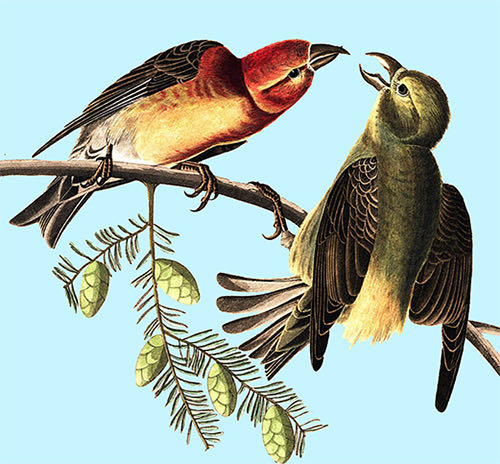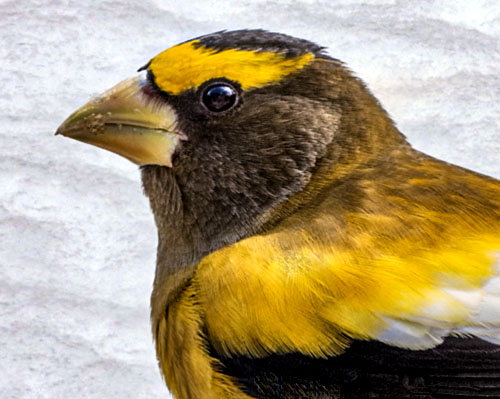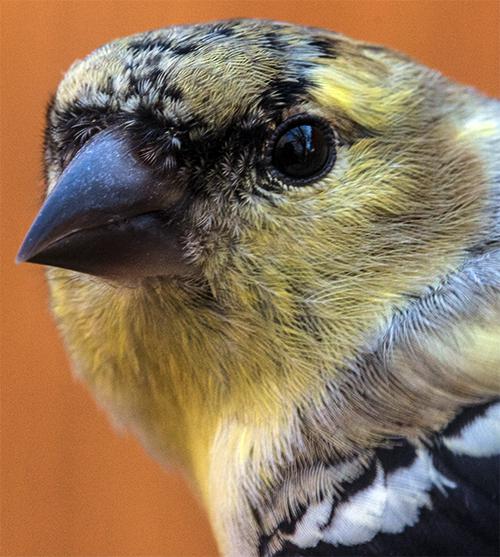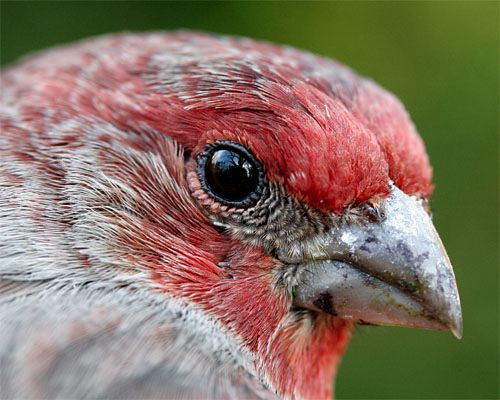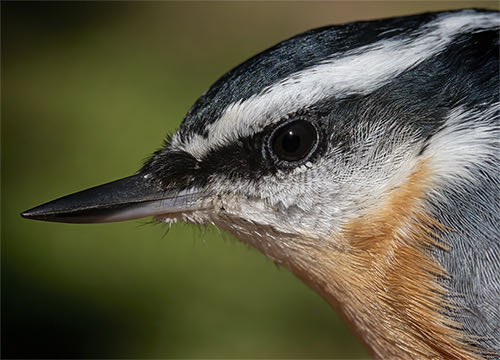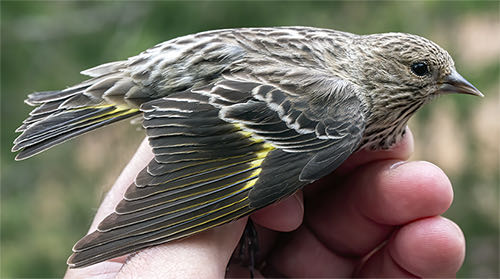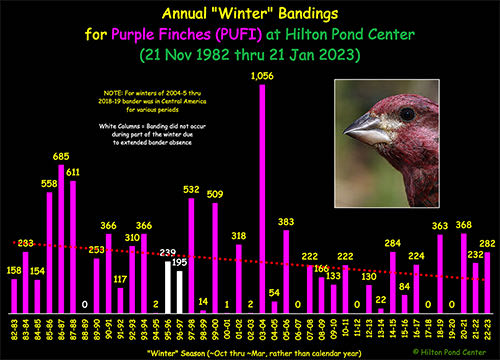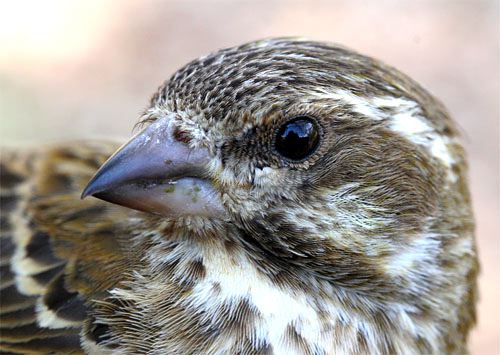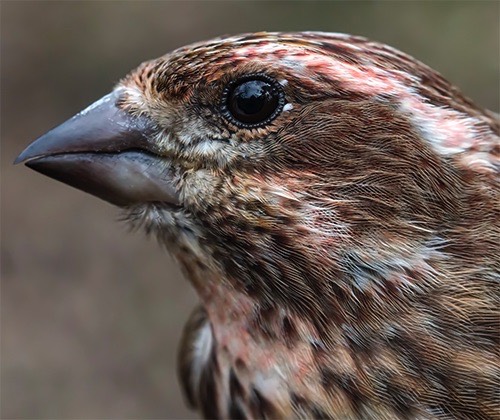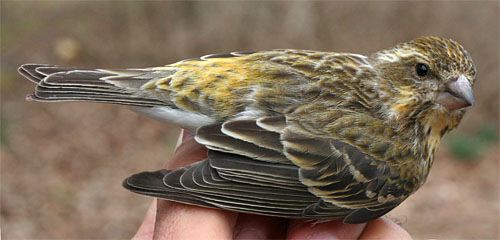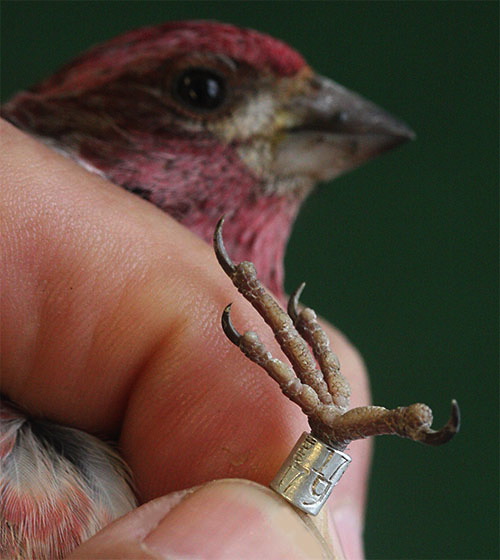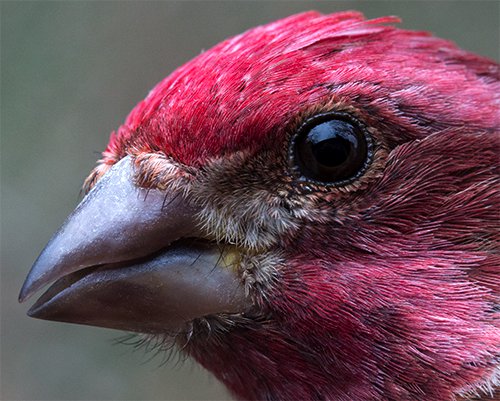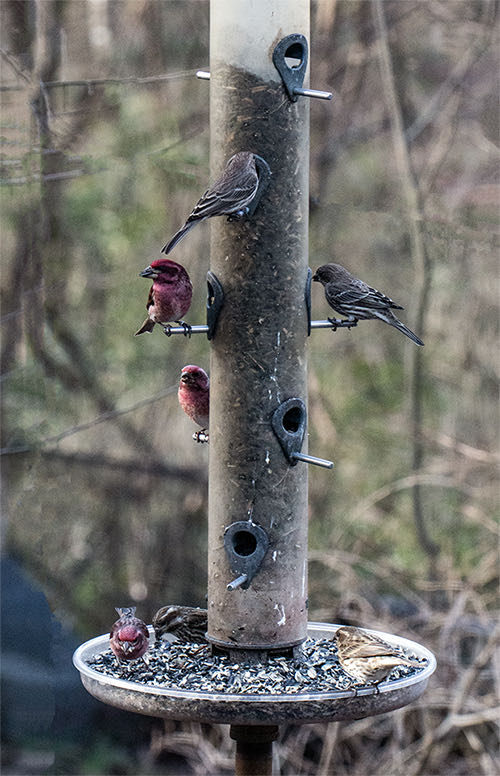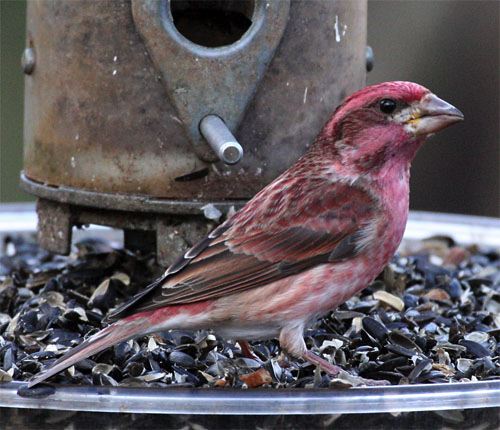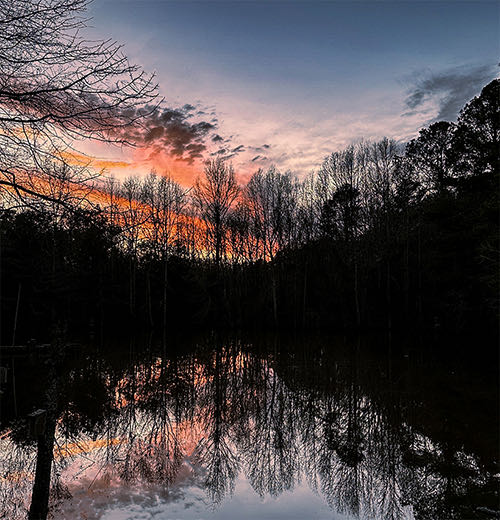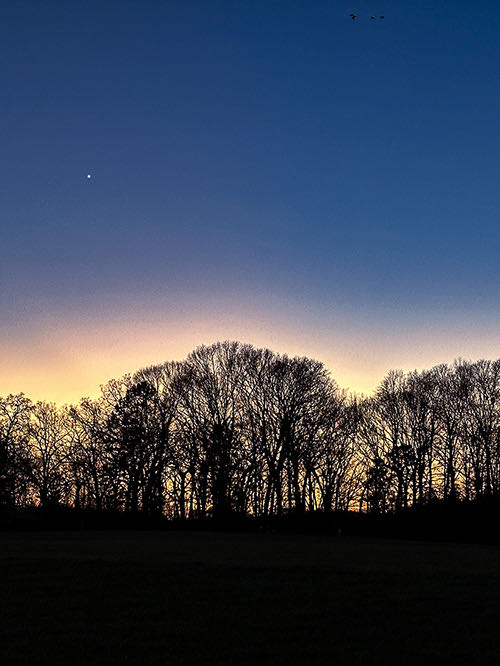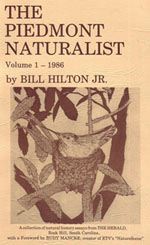- Established 1982 -HOME: www.hiltonpond.org
THIS WEEK at HILTON POND Subscribe for free to our award-winning nature newsletter (Back to Preceding Week; on to Next Week) |
(immature male Rufous Hummingbird at right) |
GOT WINTER FINCHES? Each fall the Finch Research Network puts out a "Winter Finch Forecast" predicting whether various northern-breeding finches will migrate south as cold weather ensues. The prediction is based largely on how successful various Canadian trees were at making seeds and nuts during the just-previous growing season. (More seeds means more winter forage available and fewer birds migrating south to find food.) Also a factor for some avian species is the extent of Spruce Budworm outbreaks in the eastern boreal forest. (Lots of nutritious budworms for nestlings result in a productive breeding season that swells a bird species' population and, in turn, leads to more southbound migration because so many birds are competing for cold-weather food). There's an interesting balance between food availability for nestlings in summer and dearth or abundance of food for fledglings and adults during winter.
All text, maps, charts & photos © Hilton Pond Center The Winter Finch Forecast includes all sorts of finches--and a few non-finches, too--including some species we'd never expect to see around Hilton Pond. Red Crossbills, for example (rendered above by John James Audubon), remain primarily in northeastern states, although there are disjunct breeding populations in the high mountains of West Virginia, North Carolina, and Tennessee--even Alabama. (A solitary Red Crossbill was confirmed south of Greenville SC in 2007.) Pine Grosbeaks never come this far south no matter the weather; same, usually, with Common Redpolls (except for a well-documented and photographed individual that showed up in West Columbia SC in 2015).
All text, maps, charts & photos © Hilton Pond Center So what did the 2022-23 Winter Finch Forecast predict for finches likely to appear at our feeders this winter at Hilton Pond Center? The following: Good southbound movement of Purple Finches (lots of Spruce Budworms during breeding season with lots of competition back home), fewer Pine Siskins (bumper crop of Canadian spruce cones with seeds), and a rare southern movement of Evening Grosbeaks (male above; as this elusive species chases scattered outbreaks of Spruce Budworms).
All text, maps, charts & photos © Hilton Pond Center The finch forecast made no predictions about American Goldfinches (winter male above)--a species that breeds uncommonly in the South Carolina Piedmont but occurs here in big numbers some winters. Forecasters also didn't speculate about House Finches (adult male below)--which are abundant year-round at Hilton Pond Center because of local breeders, even though in fall additional HOFI do still come down from northeastern breeding areas.
All text, maps, charts & photos © Hilton Pond Center So how has the Winter Finch Forecast done so far by our reckoning at Hilton Pond? Well, those coveted Evening Grosbeaks never got this far south--eBird shows no records for South Carolina and only a few for North Carolina--which was a big disappointment; we haven’t even seen this species at the Center since we banded 31 in early 1994. (Word is Evening Grosbeaks are already receding northward, so odds of them coming to our sunflower seed feeders are getting lower by the week.)
All text, maps, charts & photos © Hilton Pond Center An irruptive non-finch species--Red-breasted Nuthatch (above)--does migrate to the Carolinas some years, and the finch forecast predicted southbound movement in 2022-23. Nonetheless, eBird shows only scattered records for South Carolina this winter; here at Hilton Pond we've seen none lately and banded just 20 in 42 years--the latest in October 2020.
All text, maps, charts & photos © Hilton Pond Center The finch forecast was spot on for Pine Siskins (above); we've seen exactly zero so far this winter at Hilton Pond. This is quite a change from the huge irruption winter of 2021-22 when we caught an unprecedented 1,316 PISI. (We might have banded even more had we not temporarily run out of bands partway through the season!) Two our those siskins from that year were found and reported from far-off Washington State, near Seattle!
All text, maps, charts & photos © Hilton Pond Center And the forecast was also correct about Purple Finches (adult male, above) that have been by far our most abundant species this winter at Hilton Pond Center. After the first PUFI arrived on 22 November we banded 282 PUFI through 21 January (see chart below)--already more than our 42-year seasonal average of 236--with at least another month to go before Purple Finches begin departing. All text, maps, charts & photos © Hilton Pond Center Since 1982, our earliest fall banding date for a Purple Finch was 19 October 1991, but that was far earlier than our typical first date of mid-December. (Incidentally, our latest spring banding was on 24 April 1983--well after the typical late date in early to mid-March.) Often--16 times in 42 winters--our first PUFI banding came AFTER 1 January. In fact, of 9,876 Purple Finches banded at the Center the vast majority (n = 9,370, or 95%) were captured January through April, suggesting PUFI may be facultative (non-obligate) migrants that don't start wandering this far south until food sources diminish up north and weather reaches its coldest temperatures.
All text, maps, charts & photos © Hilton Pond Center Unlike House Finches in which young males get their raspberry color during their first autumn season, it takes male Purple Finches two years to go red. That means at your feeder in the Carolinas any brown PUFI (as above) could be a female of any age--OR a young male. Even in-hand it is sometimes not possible to determine a brown PUFI's sex, so don't be calling all those brown ones females! (NOTE: At the bottom of this page is a list of all birds recaptured this week at the Center; included are several "old" Purple Finches--several of which could not be sexed at time of banding but now are confirmed as male or female.)
All text, maps, charts & photos © Hilton Pond Center Complicating this are young males that are inexplicably advanced and already have pink wash to their body plumage. Problem is, old females sometimes do the same--as in the one above we recaptured five winters after banding her as a brown hatch-year bird. Nonetheless, females apparently never get as bright as adult males, although it's quite common for older female PUFI to have bright red rumps.
All text, maps, charts & photos © Hilton Pond Center And then there are those gold Purple Finches (see above) whose genetics and/or eating habits keep them from laying down red pigment derived from plant matter they eat. We refer to such individuals as being "xanthochroic" (from Greek for "yellow"). We estimate--based on captures--this aberration occurs to some degree in about 1% of PUFI.
All text, maps, charts & photos © Hilton Pond Center Anytime we captured a red "normal adult male" Purple Finch last fall we aged it as "after-hatch-year" (AHY) because it had to have hatched before 2022. (Remember, if he hatched in 2022 he'd still be brown.) We couldn't assign him an exact age, so we used the Bird Banding Lab's default designation of AHY. Starting 1 January 2023, however, that same red male would become "after-second-year." (Next year he'll be after-third-year," and so on until maybe "after-twelfth-year"." The longevity record for a banded PUFI is 12-years-plus). What's cool is when we band a young "hatch-year" brown Purple Finch and recapture it five years later as a red adult male like the one above; then we know it's exact age is five years.
All text, maps, charts & photos © Hilton Pond Center We do like banding red Purple Finches because we know something about their age AND sex, and this year we seemed to trapping a lot of them. Through 21 January, of the 282 PUFI captured at the Center 66 were adult males, i.e., 23%. To compare, we looked at our winter records and saw that last year (2021-22) only 19% were adult males--which validated our suspicion we were getting more of this age and sex in 2022-23. We searched a bit further, however, and found in 2020-21 we banded 28% adult males, and in 2018-19 the number was much higher at a whopping 37%. (This is an example of why it's better to depend on written records than one's memory!) We don't know what all these percentages mean, but we'll be keeping a closer eye on age/sex ratios in future years.
All text, maps, charts & photos © Hilton Pond Center So that's our interim report on finch abundance this winter at Hilton Pond Center. By now we've sadly given up on seeing any "holy grail" Evening Grosbeaks, and it seems unlikely any Pine Siskins will appear--although one never knows with this vagabond species. It looks like American Goldfinches will not be having a big winter; we banded a cluster of 18 in mid-December but now only see one or two per day at the feeders. And we have no idea what happened to all the local House Finches after we banded a bunch of young ones last summer. (In the photo above, there's one female HOFI on a perch at right; all the rest are Purple Finches.)
All text, maps, charts & photos © Hilton Pond Center In the near absence of all those other finches, that leaves our plethora of migrant PUFI as our predominant species this winter. Only half-jokingly, we refer to Hilton Pond as THE southeastern epicenter for Purple Finches; on-going eBird reports--and our 9,905 bandings of them since 1982--bear out the claim. And with 282 PUFI banded through the third week in January, we're pretty confident we'll go well over the 300-bird mark for 2022-23 before they all hustle back north to Canada to start looking for Spruce Budworms to feed a new set of future-migrant Purple Finch nestlings. All text, maps, charts & photos © Hilton Pond Center HILTON POND SUNSETS "Never trust a person too lazy to get up for sunrise
Sunset over Hilton Pond, 07 January 2023 Please allow us, if you will, one final subtle sunset in honor and memory of Norma Laverne Dressler Ballard (mother of Susan Ballard Hilton) laid to rest yesterday in Greenville SC after a long, amazing, and wonderful life of 97 years. All text, maps, charts & photos © Hilton Pond Center
Sunset over Hilton Pond, 20 January 2023 This evening's sunset--facing west with the pond beyond the trees--had a couple of unexpected bonuses: That pinprick of light at left is the planet Jupiter, and at upper right (look hard!) are five Canada Geese winging their way toward some larger pond or lake where they'll wait out the darkness. All text, maps, charts & photos © Hilton Pond Center Don't forget to scroll down for lists of Hilton Pond supporters and of all birds banded and recaptured during the period. Photoshop image post-processing for this page employs |
|---|
|
"This Week at Hilton Pond" is written and photographed by Dr. Bill Hilton Jr., executive director of Hilton Pond Center for Piedmont Natural History
|
|
|
Please refer "This Week at Hilton Pond" to others by clicking on this button: |
|

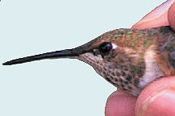 Oct 15 to Mar 15:
Oct 15 to Mar 15: